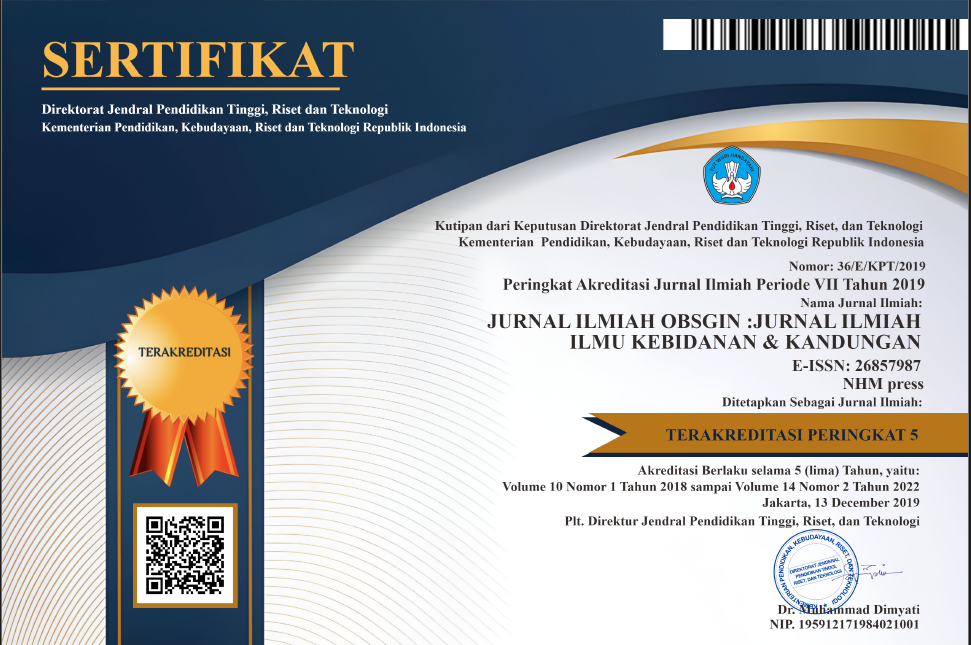PENGARUH PENYULUHAN KESEHATAN REPRODUKSI TERHADAP PENGETAHUAN TENTANG PERILAKU SEKSUAL REMAJA
Abstract
The impact of the lack of knowledge of adolescents on reproductive health is that many adolescents are already sexually active. The purpose of this study was to find out how big the influence of counseling on reproductive health is on changes in adolescent knowledge in Susukan Village, East Jakarta in 2023. This research is a type of quasi-experimental research with a one group pre test and post test design carried out in one group only without a comparison group aims to see the Effect of Counseling About Reproductive Health on Adolescent Knowledge. The sample in this study amounted to 95 students. The research instrument used a questionnaire filled out by teenagers. The independent variable in this study that was studied was the knowledge of adolescents. The results showed that of the 95 adolescents who attended counseling about reproductive health, prior to counseling it was shown that the frequency of knowledge about adolescent reproductive health was mostly low, namely 54 respondents (56.8%) and the remaining 41 respondents who had high knowledge. And after counseling the results were obtained, out of 95 respondents there were 87 respondents who had good knowledge (91.6%) and the remaining 8 respondents (8.4%) had low knowledge. The results of the Mc.Nemar test showed that before and after counseling interventions were carried out on adolescent reproductive health with the test results obtained that there were significant differences in adolescent knowledge with a p value of 0.000 where <0.05. The conclusion from this study was that the knowledge of adolescents prior to health education about reproductive health was lacking, with the number of respondents 95 being 72.78%. The effectiveness of health counseling using the lecture method and also presentation of power points towards increasing reproductive health knowledge in adolescents is 79.73.
References
Anas, S. H. (2010). Sketsa kesehatan reproduksi remaja. Yinyang: Jurnal Studi Islam Gender Dan Anak, 5(1), 199–214.
Cook, R. J. (2020). International human rights and women’s reproductive health. Women, Medicine, Ethics and the Law, 37–50.
Davis, D.-A. (2020). Reproductive injustice: Racism, pregnancy, and premature birth. Oxford University Press.
Djama, N. T. (2017). Kesehatan reproduksi remaja. Jurnal Kesehatan, 10(1), 30–34.
Emilia, O., & Prabandari, Y. S. (2019). Promosi kesehatan dalam lingkup kesehatan reproduksi. UGM PRESS.
Ernawati, H. (2018). Pengetahuan kesehatan reproduksi remaja di daerah pedesaan. Indonesian Journal for Health Sciences, 2(1), 58–64.
Fitriana, H., & Siswantara, P. (2018). Pendidikan kesehatan reproduksi remaja di SMPN 52 Surabaya. The Indonesian Journal of Public Health, 13(1), 107–118.
Hasanah, H. (2016). Pemahaman kesehatan reproduksi bagi perempuan: Sebuah strategi mencegah berbagai resiko masalah reproduksi remaja. Sawwa: Jurnal Studi Gender, 11(2), 229–252.
Marhamah, M., Herinawati, H., & Lilis, D. N. (2021). Pengetahuan dan Persepsi Remaja Putri Tentang Kontrasepsi di SMA 8 Rengas Bandung Kabupaten Muaro Jambi. Nursing Care and Health Technology Journal (NCHAT), 1(3), 129–136.
Permatasari, D., & Suprayitno, E. (2021). Pendidikan Kesehatan Reproduksi pada Remaja. Jurnal Empathy Pengabdian Kepada Masyarakat, 8–12.
Prijatni, I., Prijatni, I., & Rahayu, S. (2016). Kesehatan reproduksi dan keluarga berencana. Pusdik SDM Kesehatan.
Rima Wirenviona, S. S. T., Riris, A. A. I. D. C., & ST, S. (2020). Edukasi kesehatan reproduksi remaja. Airlangga University Press.
Senja, A. O., Widiastuti, Y. P., & Istioningsih, I. (2020). Tingkat Pengetahuan Remaja tentang Kesehatan Reproduksi. Jurnal Keperawatan, 12(1), 85–92. https://doi.org/https://doi.org/10.32583/keperawatan.v12i1.699











